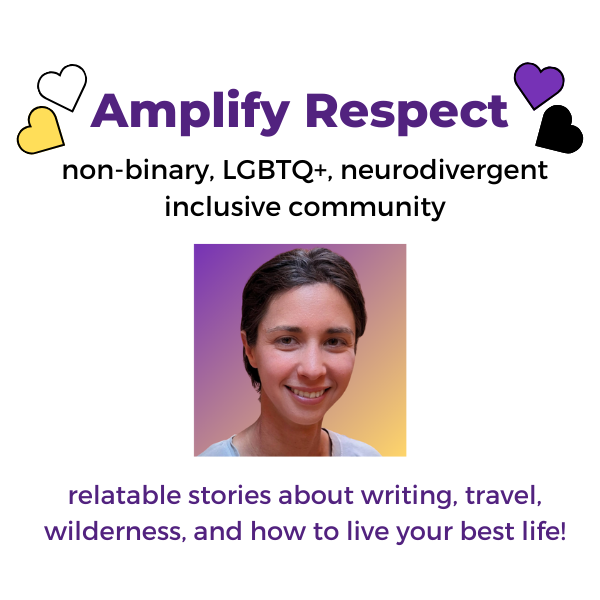I grew up with everyone using she/her pronouns for me. In my mid-twenties, a nonbinary friend listened when I said I didn’t feel like a woman and started using they/them pronouns for me experimentally. It felt right, better than “she” or “her.”
Hi, I’m Rey, a nonbinary writer! Please subscribe for more stories and resources:
I have never felt like a girl, even though I didn’t know about trans people growing up. I relate much more strongly to being a boy, although I had the experience of growing up socialized as a girl. I describe my experience as being nonbinary, which can mean different things to different people, but generally means outside of the gender binary of woman or man.
I used to have a name that was almost exclusively given to girls. I did not feel my name represented me, a nonbinary person.
If my name was merely illogical, I might have rolled with it. However, once I realized what my name meant to the rest of the world, I felt bad about the way I was representing myself. I feel it in the pit of my stomach when someone makes gendered assumptions about me. It makes me feel a little sick, a little bad about myself, a little hurt. I didn’t like my name. I didn’t care if people mispronounced it because I didn’t like the correct pronunciation better. This went on for several years.
When I finally changed my name, I was uncertain about my choice, but I had reached a breaking point. I did not want people to call me by that name anymore, and “Rey” felt like a relief.
Gendered language is everywhere. Here’s an incomplete list of phrases that can be inaccurate and stressful for me: “women,” “Jersey girl,” “well-woman exam,” “ladies,” “did he do that because you’re a woman?” Well-meaning actions can be gendered also. A friend invited me to a bachelorette party with her mostly or all-women friends. Relatives have gifted me snug-fitting feminine clothing, necklaces, and personal care products. Teachers have invited me to women’s-only martial arts events. Coworkers repeatedly invited me to join a women’s Employee Resource Group. These are such kind offerings from people I appreciate. They also make me feel I’m not read correctly by my community and worry I will make someone feel bad by declining the opportunity because I need to support myself and affirm my own gender.
Women’s only events in martial arts are particularly challenging for me. I am a feminist. I understand sexism on a very personal level. However, I am not a woman, and I don’t wish to pretend to be. Every time I decline to attend these types of events, I am concerned my community will view my non-participation as not supporting women’s spaces. That’s absolutely not the case. I support women’s spaces but feel uncomfortable in them because I’m not a woman.
I appreciate when people use my pronouns correctly, e.g., “Rey is bringing cornbread to the dinner party. They will bake it this afternoon at their house.” I feel cherished and supported. My use of they/them pronouns is tied into how people perceive my gender, though. If I had to choose, I’d prefer someone to have a nonbinary mental image of my gender instead of thinking of me as a woman, but mess up my pronouns sometimes.
Gendered assumptions are deeply intertwined into how we are socialized to use pronouns based on people’s voice, body, first name, or relationship. Some people use they/them for an unknown person or a person they want to seem unknown. (If they want to indicate this person is distant or unattractive to them, like as if they are totally not sleeping with this person, they use “they” instead of “he” or “she.” It’s a whole other essay about what this behavior does to my self-worth.) Some people use they/them when they are uncomfortable with a person using she/her or he/him. (People will incorrectly use she/her for a nonbinary person who uses they/them, and they/them for a trans woman who uses she/her; these are both, perhaps subconscious, discriminatory attempts to control who may use which pronouns.)
Most people will not realize they are speaking other pronouns when they first try to use they/them for someone. This is okay and natural — you have to practice. I always practice when a friend uses they/them or changes pronouns. I may have to “translate” old memories to use a new name and pronouns. I talk about the person, out loud, in private, when I’m doing chores or taking a walk. This little bit of prep work means I have rewired my brain to use the correct pronouns when I’m actually speaking with or about my friend.
If you say the wrong pronoun, a one-word apology and moving on is best. “She built that…sorry, they built that, really cool, isn’t it?” There is no need to let me know you will get my pronouns wrong (don’t worry, I know that already 🙂 ), or offer extended apologies. These are both ways of asking for me to approve of you misgendering me by saying, “That’s okay, don’t worry about it, it’s fine….” If you get my pronouns wrong, that’s your problem; by asking me to approve that behavior, it becomes my problem.
Whether you use my pronouns or not after reading this (I hope you do), I hope you have an understanding that my pronoun choice is not arbitrary and represents my internal gender. Please use my name or gender-neutral language for me, and if you have the chance, please practice a few sentences using they/them to refer to me. About 1 in 300 people in the United States is nonbinary. Not all of us use they/them pronouns, but for the ones who do, it can be incredibly meaningful and supportive when you refer to us correctly.
